Podcasts: Is the 'have-a-go' podcaster era coming to an end?
- Published

In 2023, there are more podcasts out there than ever before, from comedy to news, sport to true crime.
But despite continued levels of financial growth in the industry, the production of new podcasts has faltered.
Of the total number of shows globally, less than a quarter have more than 10 episodes. Has the era of the "have-a-go" podcasters come to an end?
Anyone can make a podcast. It can be free, fun and, if successful, a lucrative and career-changing endeavour.
A survey carried out by YouGov , externalsuggests that podcasts present one of the biggest growth opportunities for UK media in 2023, with global revenue in the music, radio and podcast market projected to reach $108.3bn (£87.09bn) before the end of the year.
But how does a podcast remain successful?
Second series syndrome
In the music industry, the "sophomore slump" or "second album syndrome" is a dreaded jinx that every artist must face if their first album is a success, but this ideology has now entered the ever-growing world of podcasting.
There are currently around three to four million podcasts internationally, but just over half of those have more than three episodes, with only 720,000 podcasts comprising more than 10 episodes.
The trend has led to a growth in "second series syndrome", where, like new albums from bands in the music industry, shows either halt or fail to make an impact before fully maturing.
Mark Popkiewicz, CEO of Aurra Studios, an independent studio and podcast network, believes this decline in production beyond three episodes is down to commitment from creators.
He says: "Despite uptake in listenership, production of new podcasts is down since the pandemic because many 'have-a-go' podcasters created shows but have since lost appetite to keep going."
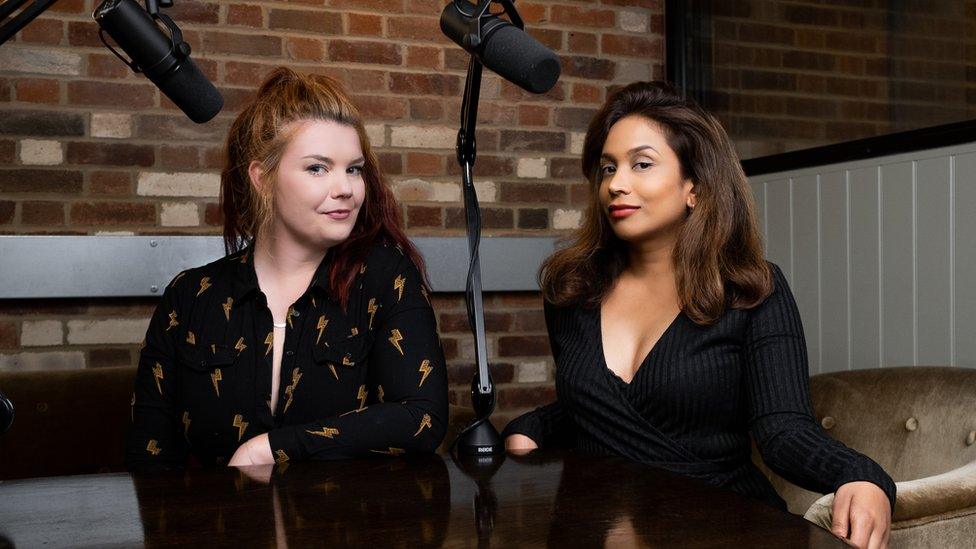
Hannah Maguire and Suruthi Bala now travel the world on live tours with their podcast RedHanded
Hannah Maguire and Suruthi Bala are two award-winning presenters who broke past the barriers and have now made careers from podcasting, recording their weekly true crime show RedHanded and travelling the world on live tours.
The presenters first met at a house party in London, where they discovered a mutual love for all things true crime and decided to create their own podcast, exploring disturbing and mysterious cases.
The show now boasts 200,000 average weekly true-crime listeners and in 2022 won the listeners' choice prize at the British Podcast Awards for the second year in a row.
The pair have hosted the podcast for the last six years and are launching their first limited series with Novel and Global on 19 April, titled Filthy Ritual, with the hopes of broadening their audience even further.
They say in their opinion, the secret to building and maintaining a successful podcast, particularly in true crime, lies in presenting something new and "meaty" to their audience.
Bala says: "Our audience is so receptive and so open to whatever we might want to try, so we've started to do more of these bigger cases that are politically, culturally or socially driven.
"I think our audience has come along on that journey with us."
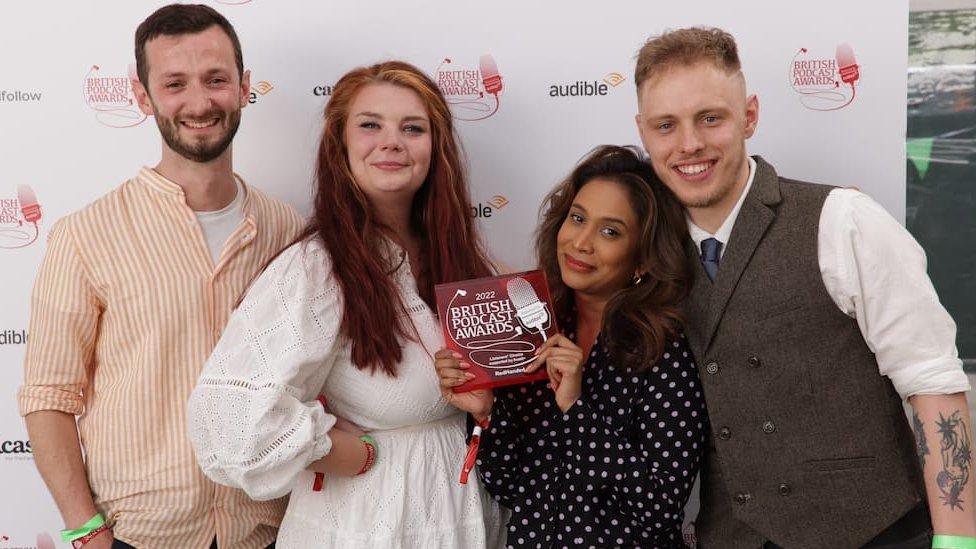
RedHanded won the Listener's Choice Award at the 2021 & 2022 British Podcast Awards
RedHanded covers a wide range of stories, from serial killers to hauntings and even more topical political murders in an attempt to present an alternative view to what is reported.
"Last year, we did the assassination of Jamal Khashoggi," Bala says.
"We've only ever heard that story told from a political angle.
"While we obviously covered the politics of it, telling it from a true-crime thinker's brain made it take on a different narrative when we told that story. Again, we attracted new people to the podcast by doing that.
"I think in terms of a limited series, you need something that's really meaty with a lot of people and a lot of moving parts."
Rather than the single episodic format of RedHanded, Filthy Ritual takes a different, more investigative approach across six episodes, looking at the story of Juliette D'Souza in a jaw-dropping tale of one of the most prolific fraudsters in British history.
Maguire says she and Bala are "really excited" about the exposure this new venture with two production companies will bring, and believes "it's going to attract a completely different audience".
It is the drive and commitment from Maguire and Bala that has lead to the continued success of their podcast.
On Filthy Ritual, Bala says: "We worked on it for a very, very long time.
"I think when we originally agreed to do it, we did not think that it would be as much work as it ended up being.
"We were always told you guys don't have to come do this interview, we can do the interview. Hannah and I said that's not the kind of show we want to be involved in. If we're going to do this, we're going to do it 100%."
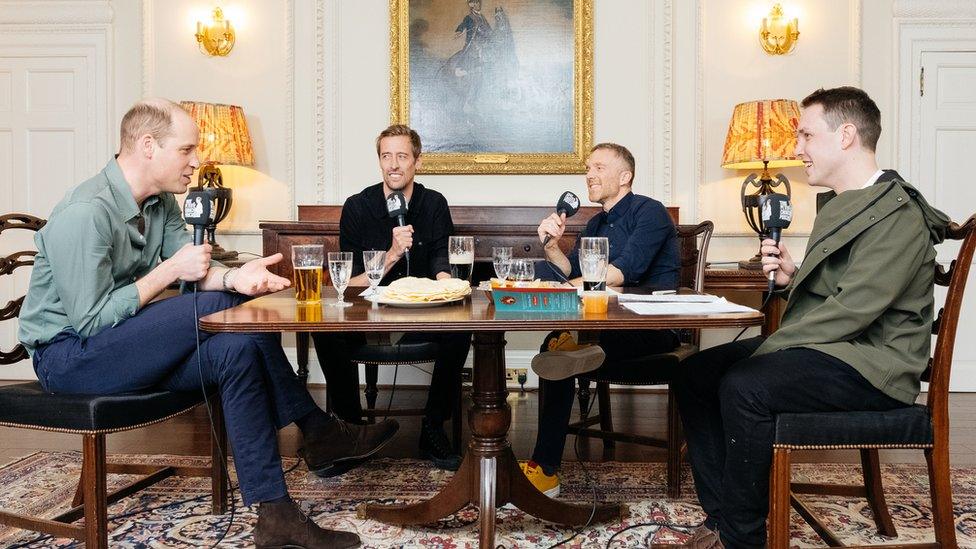
The That Peter Crouch Podcast team talked football with the Duke of Cambridge
For other topical podcasts such as the BBC's Newscast, the research is more instant with the discussion points coming to the production team in the constant form of daily news stories.
But a lot of popular podcasts must find success in reaching corners of society that aren't normally reachable, while still feeling relatable.
That Peter Crouch Podcast made national news when the team recorded an episode with Prince William, Duke of Cambridge in Kensington Palace, where they discussed his love of Aston Villa, ate curry and drank beers.
'The era of 'banter' podcasts is waning'
If top podcasts by listening figures are any indication, a recognisable name and personality-driven content is a key contributing factor to success or failure.
A 2021 Nielsen report, external found that some of the most popular podcast genres include music, true crime, news and comedy.
When looking at the top international podcasts in each of those genres, shows like Armchair Expert, Ted Talks Daily and The Joe Rogan Experience all lead their field.
All of those shows, in some form, boast a host whose personality carries the whole show and acts as a driver for the direction of each episode, something that Popkiewicz says has been "a terrifically important part of the early podcast phenomenon and in itself will remain so".
But, in his opinion, it is "not enough to sustain long-term viability of any given show".
With a growth in finances, ad-revenue and popularity, Popkiewicz says: "The emphasis on 'behind-the-scenes' activity such as research and production is becoming ever more important. Having evergreen material and imparting new information to audiences is a growing component of what drives long-term growth.
"The era of 'banter' podcasts where it's all about the chat is slowly waning. There must be more value offered to the audience for listeners to keep on wanting to come back and not drop one show for another."
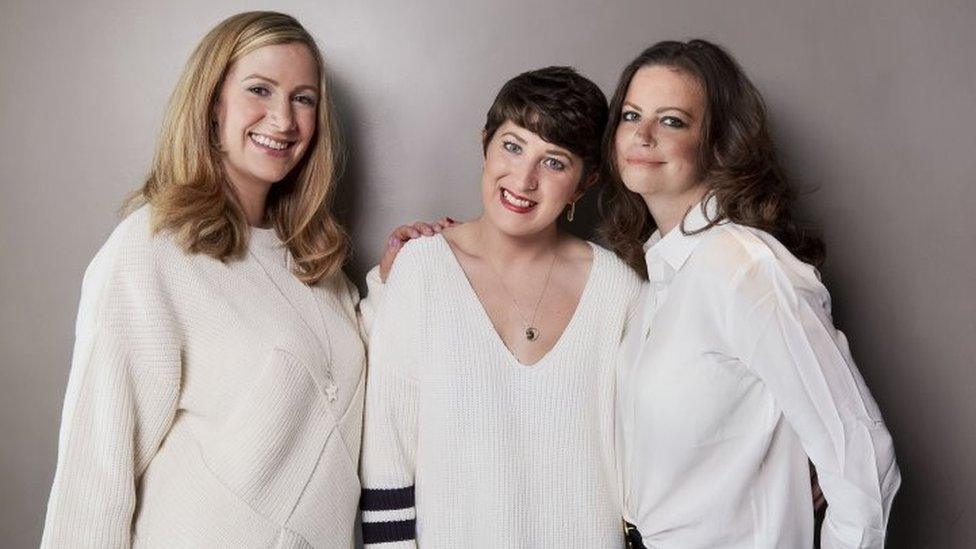
You Me and the Big C was first hosted by Rachael Bland, Lauren Mahon and Deborah James
Other award-winning podcasts find success by bringing new conversations and powerful discussions to the mainstream. In March 2023, the multi-award winning podcast You Me and the Big C released its final episode, five years to the day after its first.
The topical podcast originally hosted by Rachael Bland (who died in 2018), Lauren Mahon and Dame Deborah James (who died last year) discussed life with, treatment of and other topics relating to the disease cancer.
Still room to grow
But despite a decline in podcast longevity, listening figures are still on the rise.
According to a study conducted by Vodafone, external, the coronavirus pandemic was influential in causing a rise in the consumption of podcasts in the UK, with as many as 42% of respondents saying they listen to podcasts more now than before.
Popkiewicz believes that the number of podcasts in circulation is still just "a drop in the ocean", but adds that "the form of podcasting will have to evolve in order to maximise reach".
He says: "Everything has a ceiling. The economy, world population, you name it. Nothing is infinite, but there is much room to grow."
Maguire and Bala believe the same can be said for true crime.
"I think it really speaks to the public appetite for it that most true-crime shows are grassroots shows that people just started," Maguire says.
"The hunger for the content was out there but media production houses weren't making it.
"There's really no limit on what we can do."
- Published21 December 2018

- Published26 September 2019
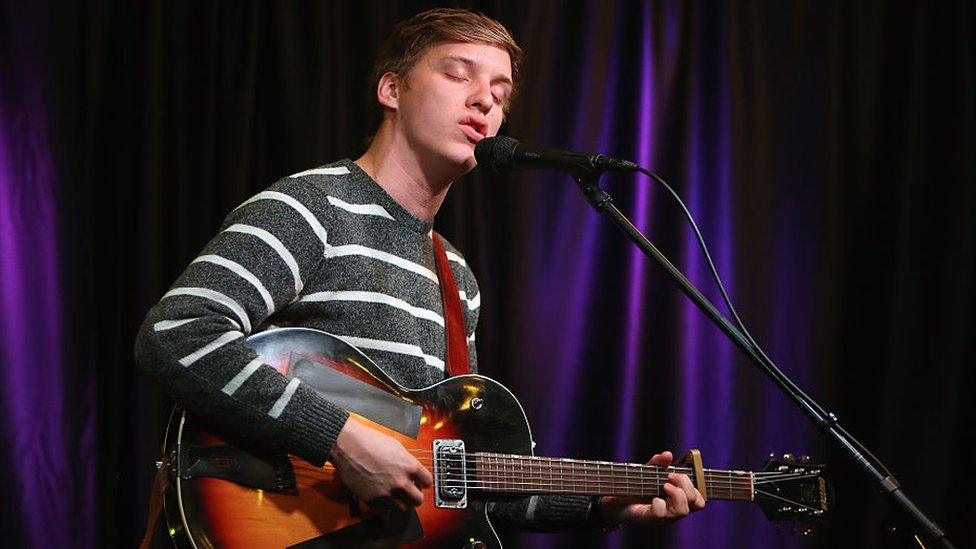
- Published7 February 2019